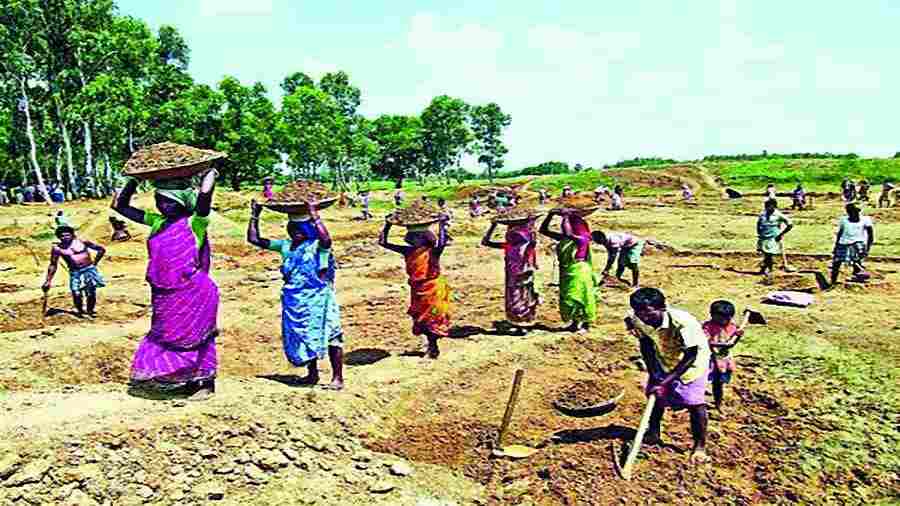Workers under national rural job scheme MGNREGA incur steep expenses, often as high as a day’s wage, and also encounter delay and fraud while collecting their wages, a survey has found.
The survey of 1,066 workers under the Mahatma Gandhi National Rural Employment Guarantee Act conducted by civil society groups LibTech India and Foundation for Ecological Security in five blocks of Odisha sought to find out the challenges faced by workers in accessing wages from disbursement agency.
The survey was conducted in the blocks of Athmallik, Banspal, Kankadahad, Pottangi and Semiliguda.
The MGNREGA provides up to 100 days’ work every year to each rural household. Under the scheme, labourers have to be provided work within 15 days of they seeking work from the panchayat office. The law provides for payment of wages within 15 days of the completion of the work.
The wages are electronically transferred to the workers’ bank or postal accounts. Workers can collect the wages from bank branches; customer service points (CSPs), or banking kiosks offering limited services; banking correspondents, who are supposed to visit the houses of customers to conduct small transactions after authentication of Aadhaar-based biometrics; ATMs, and the India Post Payments Bank, a division of India Post providing financial services to people.
The surveyors asked the participants about the hardships they faced in collecting their wages, the costs involved, the number of visits they had to make, the reasons for multiple trips, whether workers were charged commission on transactions at CSPs or through banking correspondents, and if they were defrauded.
The survey found that half the workers spent more than Rs 200, approximately equivalent to the daily wage under the MGNREGA, on every visit to the disbursement agency to withdraw their wages.
Half of the workers surveyed said they collected wages from bank branches and had to travel more than 10km to reach there. About 27 per cent of the bank-goers spent more than Rs 100 on transport. Of those accessing wages through CSPs and banking correspondents, 20 per cent spent more than Rs 100 on transport.
Although banking correspondents were supposed to visit the homes of the customers, often they made the beneficiaries come to them at unofficially designated spots, the survey found.
Due to the distance to the disbursement agencies and the time taken to withdraw wages, workers not only had to spend money out of their own pocket but also forgo work often, losing out on income. Overall, 73 per cent of the workers missed at least one day’s work when they went to collect wages.
Given the distance and time involved in accessing their wages, some workers had to spend on food as well. Women and elderly workers needed others to accompany them, which further raised the total out-of-pocket expenditure, the survey found.
About 63 per cent workers had to make multiple visits because of lack of information on wage credit. Only half the workers reported getting information about wage credit through credible sources like programme officials and SMS.
Around 4 per cent workers said they experienced fraud while assessing wages. Another 20 per cent said they did not know if they were cheated. On the nature of fraud, the workers said sometimes those disbursing wages surreptitiously withdrew more money than what the workers sought to take out of their accounts and kept that extra with themselves. This was possible because many of the beneficiaries did not have passbooks or did not know how to get them updated.
Workers assessing wages through CSPs and banking correspondents witnessed more fraud, the survey found. Many workers said they were charged a “commission” at CSPs and by banking correspondents.
Social activist Sameet Panda, who was part of the design and implementation of the survey, said the report would be shared with the ministry of rural development for appropriate action.
The Telegraph sent an email to the secretary of the ministry of rural development, Nagendra Nath Sinha, asking about the difficulties faced in accessing wages, but is yet to receive a response.











